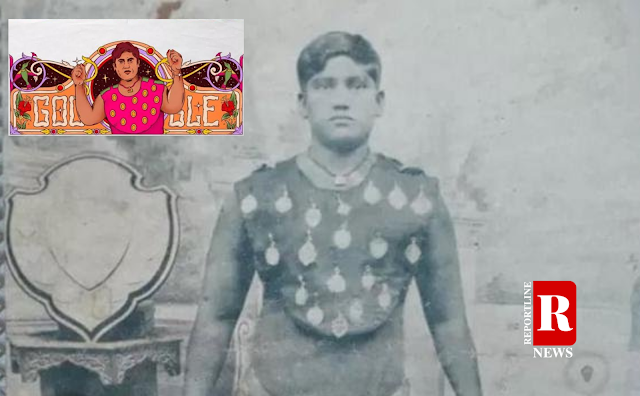 |
| Hamida Banu, India's 'First' Woman Wrestler |
New Dehli: Google Doodle Celebrates Hamida Banu, India's First Woman Wrestler, 4th May was chosen as the date to honour Wrestler Hamida Banu because it was on this day in 1954 that she challenged and defeated India's famed wrestler Baba Pahalwan.
In the male-dominated world of Indian wrestling in the mid-20th century, one woman cut an imposing figure - the 5-foot-3, 108 kg "Amazon of Aligarh" named Hamida Banu. With her brash persona and astounding feats, Banu rose to nationwide fame challenging and often defeating male champions, earning her a place in sporting lore as India's first professional female wrestler.
"Beatme in a bout and I'll marry you," the confident Banu brazenly challenged male grapplers in 1954, according to news reports from the time. That year, the woman then in her early 30s defeated two renowned male wrestlers - one from Punjab and another from Kolkata.
In May 1954, Banu traveled to the city of Vadodara in Gujarat for her next high-profile fight. Sudhir Parab, who was a child living in Vadodara then, vividly recalls the fanfare surrounding her arrival.
"Her visit was advertised through banners and posters on lorries and other vehicles," said Parab, who went on to become a celebrated kho-kho player. "The city was in frenzy over her coming."
Banu was supposed to take on a local wrestler patronized by the Maharaja of Baroda. But at the last minute, he withdrew saying he refused to fight a woman. So she faced another opponent, Baba Pahalwan, swiftly pinning him in just 1 minute and 34 seconds to raucous cheers.
By then, the "Amazon of Aligarh" had claimed some 300 career victories over male challengers across tournaments in northern India. Reporters fawned over details of her imposing physique, superhuman appetite and punishing training regimen.
"She weighs 17 stone (108 kg) and is 5 foot 3 inches tall," the Reuters news agency marveled in 1954. "Her daily diet includes five and a half litres of milk, two and a half litres of soup, one and a half litres of fruit juice, a fowl, nearly a kilo of mutton and almonds, half a kilo of butter, six eggs, two big loaves of bread and two plates of biriyani rice."
While Banu drew legions of fans enthralled by her flouting of gender norms, she also faced objections from conservatives outraged at the mere idea of a woman profaning the sacred traditions of wrestling. In Pune in 1954, a local federation blocked one of her bouts against a male opponent on moral grounds.
On another occasion after a victory, she was booed and pelted with stones by angry spectators until police intervened. Even the government of Maharashtra state's chief minister weighed in, replying to one of Banu's complaints by claiming her bouts were cancelled not because of her gender but due to crooked promoters fixing the fights.
Yet Banu's matches continued packing arenas across India through the 1950s, her dizzying fame fueled by her unapologetic boldness and taunting of male egos. In 1954, she issued another eye-catching challenge offering herself up for marriage to any man who could defeat her. Back-to-back fights that year saw her easily trounce Vera "The Female Bear" Chistilin of Russia in under a minute before announcing plans to tour Europe taking on more international competition.
Then, almost as quickly as she'd burst onto the scene, Hamida Banu appeared to vanish from public life in the late 1950s. Her incredible story may have faded entirely were it not for accounts pieced together decades later by those who knew her.
According to Banu's grandson Feroz Shaikh, her disappearance stemmed from a decision to keep her from realizing those ambitions to wrestle abroad. Shaikh says that Banu's longtime coach, Salam Pahalwan, violently attacked her, breaking bones in her hands and legs to prevent her from traveling to Europe.
"To stop her, he beat her with sticks, breaking her hands," said Shaikh, whose late father was Banu's adopted son.
Banu's neighbor Rahil Khan corroborated that account, recalling how she was left unable to walk unassisted for years afterward. However, accounts from others contradict the severity of the fallout with her mentor.
Salam's daughter Sahara maintained he and Banu were married and that the relationship remained cordial even after he returned alone to Aligarh while Banu stayed in the town of Kalyan near Mumbai. Sahara says Banu visited her ailing husband on his deathbed years later.
Whatever did transpire, the incident marked the end of Banu's meteoric athletic career and return to relative obscurity. She lived out her remaining decades in Kalyan in modest circumstances, scraping by selling milk from a small dairy operation and homemade snacks from a roadside stall.
"Her last days were difficult," Shaikh said of his indomitable grandmother who defied societal strictures in her prime only to ultimately fade from the limelight. Left unmemorialized in her lifetime, the legacy of Hamida Banu's glass-shattering achievements has been restored in recent years through efforts to retell the tale of India's "first" professional woman wrestler.
While contemporaneous reports are scant on the specifics of her origins and upbringing, her spirit and grit broke down barriers at a time when female athletes were all but unheard of in the conservative sporting culture of mid-century India. Long before women's wrestling was accepted into the Olympics or any serious backing for the sport existed, Hamida Banu etched her name into the annals as a true pioneering icon.





